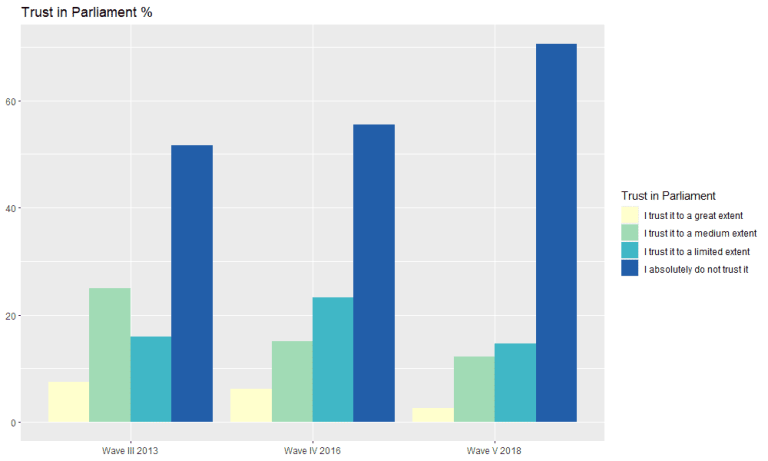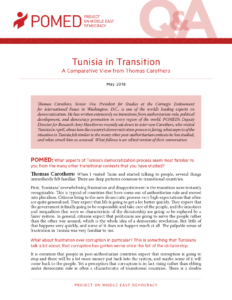Held up by Western supporters and Arab sympathizers alike as proof that democracy could bloom in the Middle East, Tunisia now looks to many like a final confirmation of the uprisings’ failed promise. The birthplace of the Arab revolts, it is now ruled by one-man decree, the Times reports:
Tunisia may serve as a reminder of what motivated Arab protesters a decade ago — and what could bring them into the streets again. While many demonstrators demanded democracy, others chanted for more tangible outcomes: an end to corruption, lower food prices, jobs….Mindful of their people’s simmering grievances, Arab rulers have doubled down on repression instead of addressing the issues, their ruthlessness only inviting more upheaval in the future, analysts warned….But popular backlashes can still threaten autocracy.
“The people pushing for Parliament, democracy, freedoms, we weren’t the biggest part of the revolution,” said Yassine Ayari, an independent lawmaker recently imprisoned after he denounced Mr. Saied’s power grab. “Maybe a lot of Tunisians didn’t want the revolution. Maybe people just want beer and security. That’s a hard question, a question I don’t want to ask myself,” he told the Times. “But I don’t blame the people. We had a chance to show them how democracy could change their lives, and we failed.”

POMED
Tunisia may yet demonstrate democracy’s resilience and capacity for renewal, others suggest.
“Let’s see if democracy is able to correct itself by itself,” said Tunis-based analyst Youssef Cherif, “and not by the gun.”
Some have viewed the decisions taken by President Kais Saied as a threat to the only democracy in the Arab World. Others have called for the United States to step up and use its leverage to put pressure on Tunisia. Right now, it is unclear which path the country will follow in the next few weeks or months, argues Ameni Mehrez, the chair of the Middle East and North Africa Space at Central European University (CEU).
To be sure, being adrift does not mean collapse. Democratic transitions take time. As several scholars have already pointed out, political institutions are not enough to achieve democratic consolidation, she writes for the Review of Democracy. Without economic reforms, the social contract will remain fragile and might even fall apart. Therefore, there will be no democratic consolidation without a well-functioning economy, and there will be no economic growth without stable and strong political institutions.

Afrobarometer
Tunisia had been viewed by many as the only success story of the Arab Spring after it transitioned from a dictatorship to a democracy and established a constitution in 2014. According to the Middle East Institute, however, Tunisia’s democracy was in a fragile state due to a combination of ineffective governance and disillusionment by much of the populace in the Ennahda-led government.

POMED
Perhaps the bigger threat comes from the mismatch between Mr Saied’s actions and the people’s aspirations—and the fact that he is repeating the mistakes of the lawmakers he usurped, the Economist adds:
In 2018 and 2019 Arab Barometer, a pollster, asked citizens of 12 Arab countries to name the main characteristic of a democracy. Tunisians, more than any other group, cited the economy: 55% said a democratic government was one that “ensured job opportunities for all”. Just 10% cited free and fair elections.
No surprise, then, that so many Tunisians supported or tolerated Mr Saied’s actions in July. The democratic system set up after the 2011 revolution has failed to produce jobs. Growth has been below 3% since 2012. Last year, thanks to covid-19, the economy shrank by 8%. Unemployment is officially 18%. A weak dinar has contributed to high inflation (currently 6.2%).
There is a path to stability, sustainable development, lasting democracy and countering radicalization, argues Adnen Hasnaoui, president of the Maghreb Institute for Sustainable Development.
Europe and the United States should raise the volume of financial aid to Tunisia and not limit it to structural reforms, nor to facilitating the democratic transition, as was the case right after his ousting, he writes for Euronews. Instead, aid should deliver a holistic, integrated support package: one that covers these two aspects but also bolsters the country’s institutions while reforming state structures, especially defense, security, justice and administration. Aid must also support socioeconomic development to ensure sustainable growth and a reduction in youth unemployment.
 Despite Saïed’s sometimes enigmatic or incoherent political views, his past statements make very clear his disdain for parties, his support for radical decentralization, and his desire for a presidential system, adds Mohamed-Dhia Hammami, an independent Tunisian researcher and analyst. How he will act on these ideas—and whether his actions will alleviate or deepen Tunisia’s crisis—remains to be seen, he writes for the Project for Middle East Democracy (POMED).
Despite Saïed’s sometimes enigmatic or incoherent political views, his past statements make very clear his disdain for parties, his support for radical decentralization, and his desire for a presidential system, adds Mohamed-Dhia Hammami, an independent Tunisian researcher and analyst. How he will act on these ideas—and whether his actions will alleviate or deepen Tunisia’s crisis—remains to be seen, he writes for the Project for Middle East Democracy (POMED).
Saied’s proposal to take charge of drafting political overhauls and constitutional amendments with the help of a committee that he would appoint drew alarm from the U.G.T.T. labor union, which was part of a quartet of groups awarded the 2015 Nobel Peace Prize for an initiative that helped Tunisia’s fledgling democracy survive a political crisis in 2013. the Times reports.
“The amendment of the Constitution and the electoral law is a matter that concerns all components of society,” it said, calling on Saied to engage in talks rather than monopolizing the power to change the Constitution.
The U.S. House of Representatives Foreign Affairs Committee holds a hearing, Tunisia: Examining the State of Democracy and Next Steps for U.S. Policy. October 14, 2021 1:00 PM (see above).







